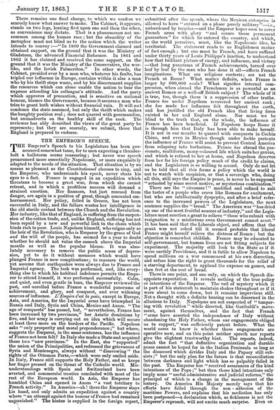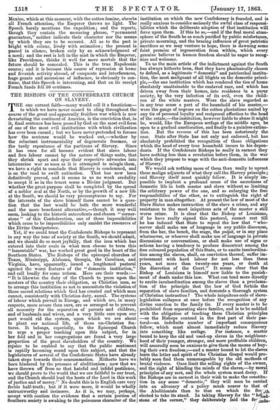THE EMPEROR'S SPEECH. T HE Emperor's Speech to his Legislature has
been pro- nounced somewhat tame, for to men expecting a thunder- bolt a hailstorm seems reassuring ; but never was speech pronounced more essentially Napoleonic, or more exquisitely adapted to the needs of the situation. That situation is by no means so pleasant as the Constitutionnel chooses to sing, and the Emperor, who understands his epoch, never shuts his eyes to a fact. France is engaged in an expedition which threatens to become a great war, from which she cannot retreat, and in which a profitless success will demand a strained exertion. Her finances, but just rescued from danger, are again in a position of great, though concealed em- barrassment. Her policy, foiled in Greece, has not been successful in Italy, and the failure wastes her intelligence in the old sterile contest between the Church and the Revolution. Her industry, like that of England, is suffering from the suspen- sion of the cotton trade, and, unlike England, suffering has not been repaid by a new and powerful link in the chain which binds rich to poor. Louis Napoleon himself; who reigns only as the heir of the Revolution, who is Emperor by the grace of God and the will of the people, has seemed for a year to doubt whether he should not value the cassock above the Imperial mantle as well as the popular blouse. It was abso- lutely necessary to remove the public sense of depres- sion, yet to do it -without menaces which would have plunged France in new complications; to reassure the world, yet assume that earthquakes were always due to France and Imperial agency. The task was performed, and, like every- thing else to which his habitual indolence permits the Empe- ror to attend himself; it was performed successfully. Calm, and quiet, and even gentle in tone, the Emperor reviewed the past, and unrolled before France a wonderful panorama of achievement, and glory, and conquest, and ever widening sources of influence. L'Enapire c'est la pair, except in Europe, Asia, and America, for the Imperial arms have triumphed in Russia and Italy, Syria and China, Mexico and Anam. "The age of conquests" has passed, but, "nevertheless, France has been increased by two provinces," her Asiatic dominions by five, and her army is carrying out an idea which will secure at least three more on the borders of the Pacific. Napoleon asks "only prosperity and moral preponderance ;" but where, suggests the Emperor, in the same sentences, has the influence of France not been felt? In Italy she made a State and acquired those two "new provinces." In the East, she "supported" the union of the Principalities, and redressed the grievances of Syria and Montenegro, always without " disavowing " the rights of the Ottoman Porte,—which were only smiled aside. In Italy, France still supports the Holy Father, and so keeps her finger pressed on the throat of the Cathelic world. Mis- understandings with Spain and Switzerland have been averted, and commercial treaties concluded with most of the rest of the European world. In Asia, the Emperor has humbled China and opened in Anam "a vast territory to French activity." In America—ah ! there the Emperor stays Lis hand, and only admits an expedition against a country where "an attempt against the honour of France had remained uniTnished." The hiatus is supplied in the foreign report, submitted after the speech, where the Mexican enterprise is allowed to have "entered on a phase purely military "—i.e., unburdened by treaties—and the Emperor hopes soon to cover French arms with glory "and secure those permanent guarantees" for which he entered the country, and which, as the world perceives, must, like the Napoleonic idea, be territorial. The statement reads to us Englishmen matter of fact enough ; but one must be French, and have suffered under thirty years of Louis Philippe's inaction, to understand how that brilliant picture of energy, and influence, and victory —that long panorama of French achievements, turned over leaf by leaf by the man who has done it all—affects French imaginations. What are religious contests ; are not the French at Rome? What matter deficits, when France is larger by 600,000 souls? What signifies internal com- pression, when abroad the Frenchman is as powerful as an ancient Roman or a well-off British subject? The whole of it is true, too, though there 'a a suppression of other truths. France has under Napoleon recovered her ancient rank ; she has made her influence felt throughout the earth, and has justified the old French idea that living force existed in her and England alone. Nor must we be blind to the truth that, on the whole, the influence of France has been beneficial. If Napoleon keeps Rome it is through him that Italy has been able to make herself. It is not in our mouths to quarrel with conquests in Cochin China, and even in Mexico though under feeble pretexts the influence of France will assist to prevent Central America from relapsing iuto barbarism. France has abroad the pas- sionate, multiform, many-coloured life which suits her genius, and which is refused to her at home, and Napoleon deserves from her for his foreign policy much of the credit he claims, and the Legislature is so willing to accord. Only do not let us be told that all this forms a policy which the world is not to watch with suspicion, or that a sovereign who, doing all this, still says the Empire is peace, is never to be supposed "actuated by some secret motive, or mysterious combination."
There are the " circenses " modified and refined to suit the tastes of a people who crave like Romans for excitement, but who are intellectually dyspeptic, and after a brief refer- ence to the increased powers of the Legislature, the next sentence supplies the "bread." The American war "has dried up one of the most fruitful sources of industry," and the Legis- lature must sanction a grant to relieve "those who submit with resignation to a misfortune even Government cannot avert." It has been said that the Liberals object, and affirm that the grant was not asked till it seemed probable that liberal France might herself relieve the distress of Rouen; but the objection is somewhat childish. France may be educated to self-government, but human lives are not fitting subjects for experiment. The majority still look to the State as if it were earthly Providence, and it is futile to allow Napoleon to spend millions on a war commenced at his own discretion, and refuse him the right to grant thousands for the relief of a starving department, to applaud the expense on games, and then fret at the cost of bread.
There is one point, and one only, on which the Speech dis- appoints expectation. It reveals nothing of the true policy or intentions of the Emperor. The veil of mystery which it is part of his statecraft to maintain shakes throughout as if it were about to come down, but it remains impervious still. Not a thought with a definite bearing can be discerned in the allusions to Italy. Napoleons are not suspected of "tamper- ing with revolution "while directed, like Garibaldi's move- ment, against themselves, and the fact that French "arms have asserted the independence of Italy without abandoning the Holy Father, whom our engagements obliged us to support," was sufficiently patent before. What the world cares to know is whether those engagements are operative now, and on this point neither speech nor reports give the slightest trustworthy hint. The reports, indeed, admit the fact "that definitive organization and durable peace cannot be hoped for in the Italian Peninsula so long as the disaccord which divides Italy and the Papacy still sub- sists ;" but the only plan for the future is that reconciliation between darkness and light which has so palpably failed in the past. The Emperor has "received assurances of the kind intentions of the Pope ;" but then those kind intentions only imply some "useful administrative and judicial reforms," the principal of which is a change in the management of the lottery. On America His Majesty merely says that his efforts have failed through the non - adhesion of the maritime Powers, and explains that his mediation. has only been postponed—a declaration which, as fickleness is not the Emperor's reproach, will not excite much surprise. Even on Mexico, which at this moment, with the cotton famine, absorbs all French attention; the Emperor throws no light. The Speech barely mentions the expedition; and the reports, though they contain the menacing phrase, "permanent guarantees," neither indicate their character nor the means by which they are to be secured. All as to the past is bright with colour, lively with animation ; the present is passed in silence, broken only by an acknowledgment of • a need ; and the rest is left in the mist in which the Emperor, like Providence, thinks it well for mere mortals that the future should be concealed. This is the true Napoleonic course; and it is because this course of repression at home and feverish activity abroad, of conquests and interferences, huge grants and accessions of influence, is obviously to con- tinue, that this Speech is interesting, and that on its receipt French funds fell 30 centimes.































 Previous page
Previous page